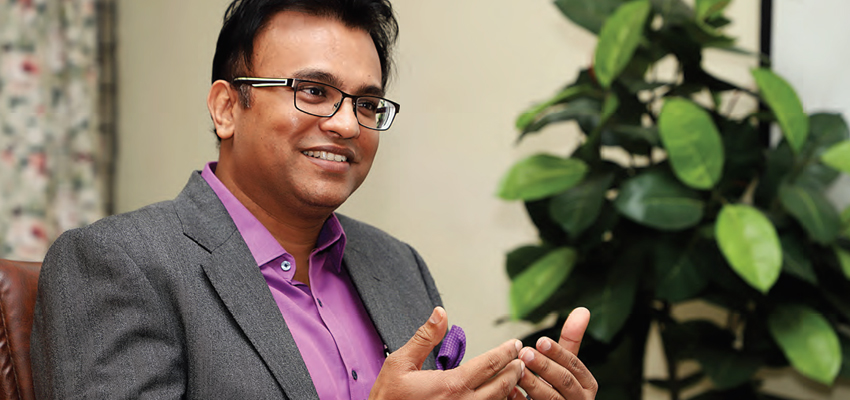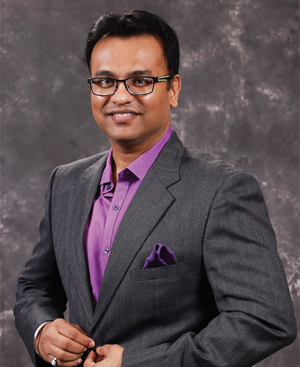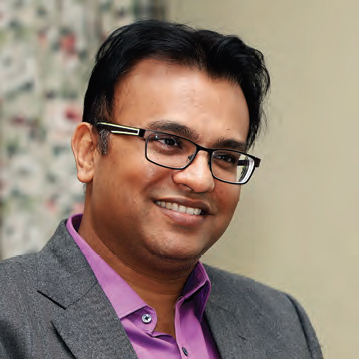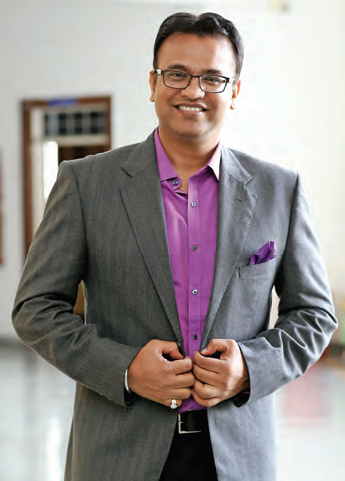Company 1st Team 2nd Individual last

With over two decades of professional experience in industries varied in their endeavours, temperaments, approach and policies, Rahul Pinjarkar, Director-HR, Trent Hypermarket Pvt. Ltd., comes with an experience in creating a competitive advantage through people and further transforming a company to become an employer of choice. He has spent a major part of his career in Philips, Novartis and Saint-Gobain Group and from the past 13 years, he has been in a Country HR Head’s role providing leadership to the HR function that includes building a culture of meritocracy, improving functional delivery and building a talent pipeline. As an active thought leader in the area of HR, Pinjarkar talks to Corporate Citizen about his career journey, values and principles and learnings arising out of his professional experience
"Core charm of HR remains the same. What we do at the end of the day is just two things - we help businesses achieve their performance for today and we help businesses build an organisation for tomorrow"
Corporate Citizen: You are in the HR profession for over twenty-two years now, what would you say about the industry over these years and does the role of HR change with the change in the industry?

Rahul Pinjarkar: If you look at my career, I have always moved across industries, so I do not have a story about a single industry but, I have many stories about many industries. My career largely spans over in a consumer durable industry, pharmaceutical and vaccine industry and then in a manufacturing space, particularly, in construction products industry. Today, I work for a retail industry, in a B2C space and very people-intensive business. In a manufacturing industry, they say factories are our assets, however, in retail, it is completely the other way round with people being the most important asset. That is the difference I see when I move across industries.
Nevertheless, somewhere I realised that the core charm of HR remains the same. What we do at the end of the day is just two things-we help businesses achieve their performance for today and we help businesses build an organisation for tomorrow. Performance is delivered by doing two things (a) ensuring that we get the right people ahead of time, shortening our learning curve and (b) we develop and nurture their performance during their time within the organisation.
On the other hand, we build an organisation for tomorrow. Again by doing two things (a) ensuring we have a constant leadership pipeline in the form of talent that would become our next set of leaders and (b) ensuring that we have the right culture and ecosystem, wherein, people are encouraged to give their best at work.
While the role of HR more or less remains the same, my learning was to look at the business context while putting theory into practice.
"Performance is not the only criteria for Talent Identification, the individual’s career aspiration is also equally important. Not all of us have similar talent. However, all of us must have an equal opportunity to develop our talents"
CC: As you are saying that, you focus on getting the right people in whatever industry it be. It must be depending on what vision the industry needs—you get those people aligned inside. So, when you say this, what are those kinds of people and what is the environment you would expect for them, say, for the human resource to be in the company?

Irrespective of the maturity phase that the company is falling in, I think helping find the right talent for the business is the key job that we as practising HR Managers do for our CEOs. I have always been an intent hirer throughout my career because I believe it is relatively easier to build content, however, extremely difficult to develop one’s intent. Intent can be seen by testing them in difficult circumstances. If one had overcome the toughest of obstacles thrown at them then one is believed to have an intent to make things happen. I also look at the quality of risk-taking, curiosity and a growth mindset in people. My philosophy for talent management has always been hire the people who know more than you do about the jobs they are being hired for and then get out of their way.
Now as far as the environment is concerned, my endeavour has always been to encourage the diversity-gender, disability and thought. I represent an organisation that is an equal opportunity employer and is committed to building a diverse and inclusive workforce. Fourteen per cent of our workforce comprises of persons with disabilities. In line with our belief that the company is as good as people working for it, our effort has always been in the area of our people and their well-being. To give you an example, a research says 50% of the corporate population is coping with workplace stress of some kind, whereas, only 30% of Indian organisations have a mental well-being programme. There is a clear gap between what the employees are facing versus what employers are doing towards mitigating these concerns. We took cognisance of this fact and administered an organisation wide dipstick seeking employees’ opinion on how many feel that there is a need for a programme around mental health and wellness and 76% of the employees who took the survey indicated some signs of stress and anxiety and 86% expressed interest in participating in a mental health and wellness programme. Recognising the importance, we launched an organisation-wide Employee Assistance Programme (EAP) in collaboration with a well-known firm operating in that space. EAP offers confidential counselling services to employees and their family members for mental and emotional well-being. Counselling helps employees deal with various work-life challenges like stress, anxiety, parenting, relationship issues, work-life balance by openly discussing their concerns with a trustworthy, non-judgmental counsellor, leading to greater clarity and new perspectives. A year after the launch, we have 45% of active users every month availing these services, especially during these Covid-19 times.
The bottom line is do you have the culture and ecosystem wherein people’s interests are being heard and their issues are handled with a lot of empathy and care. We are in a business that is consumer-facing and we all know happy colleagues generate happy customers. At the end of the day, it is all linked to productivity and business success. The underlying assumption is the company rests on three pillars – shareholders, employees and customers and there has to be an effective balance amongst all three for a company to function smoothly.
CC: You have led the process of making an organisation, an employer of choice. Could you please talk about the key aspects in favour of building a strong talent brand compared to a consumer brand?
Traditionally, India Inc. has focused more on consumer branding as compared to talent branding. I believe they are the two sides of the same coin and that they complement each other. A great consumer brand helps in attracting talent but the decisive moment comes when the good people stay and grow with the organisation. A well-defined EVP is key and a core to building a passionate talent force. An engaged employee is the one who feels committed to his organisation and its goal and delivers consistent business results.
A critical success factor of a talent brand is also how you build a talent pipeline. It simply means do you have people ready to take leadership positions in near future. The idea is to identify employees with a leadership potential early in their career and provide them with focused development and accelerated path. The talent identification criteria has to be necessarily performance, respect towards core leadership values and development potential.
Talent review process becomes more effective when you have Line Managers and HR Managers taking joint ownership of the talent management process, fully assimilate the talent identification criteria and seek to ensure transversal career paths for talents by networking with colleagues.
We keep in mind that Performance is not the only criteria for Talent Identification, the individual’s career aspiration is also equally important. Finally yet importantly, the talent evaluation is a consultative process and hence, errors there in are not only acknowledged but also resolved.
Then as an outcome of this process, we get a small set of people who are ready for the next level roles now, 18 months later and 24-36 months later. Therefore, that is how we differentiate people and not discriminate against them. Not all of us have similar talent. However, all of us must have an equal opportunity to develop our talents.
"Leadership is contextual. I personally believe companies do not build leaders, they simply put them into leadership positions and leadership arises of what you are and stand for"
CC: As an HR leader, you must have been at the forefront in creating leaders for tomorrow. From your experience, could you tell us the challenges in the area of leadership and leadership development?

In my view, leadership is contextual. I personally believe companies do not build leaders, they simply put them into leadership positions and leadership arises of what you are and stand for. Yes, good companies create the right environment for leaders to practice their leadership skills but certainly not the context.
Leadership on the one hand is a mysterious concept and on the another hand it has been highly controversial. Many memorable phrases are coined on the subject such as ‘Managers do things right while leaders do right things’ or ‘Leadership is a state and not a status’. However, these catchy phrases do not fully satisfy the person who wants to become a leader. Therefore, the question is how do we create effective leadership development programmes? Yes, there are leadership development programmes focused towards telling success stories about what leaders did and how they got the results but I am not sure if replicating it in a different context by different people at different times will give us similar results. In the hindsight, we can always create a story but if you ask me to make a choice for you “to be or not to be”, it’s difficult; these programmes would give us wow effect and of course, there would be some amount of learning from the knowledge standpoint but certainly not from the Talent standpoint. Because talent in my view is a natural ability to do something well.
CC: In your view, is the leadership required more at the senior level or do you think it is required more at the budding level?
I have worked in organisations where the focus was only on senior leaders, however, I have also worked with companies where the focus was on certain individuals who are perceived to be at a high-potential-some psychological testing/ assessment centres. I have developed a belief that a leadership is necessary at all levels. I have seen many people, not just those who occupy positions of authority practising leadership. Sometimes there is a need to develop senior leaders itself and many times the leadership skills possessed by the most senior people in the organisation becomes the leadership ceiling and that is extremely rare to find anyone whose leadership skills exceeds those of the people on top. I agree that the best leaders are promoted to most senior positions, however, in the cases where senior people have mediocre scores then the leadership tent is to be lifted making room for others to grow. In my view, getting leaders to excel, benefits everyone. So, instead of focusing on low performing leaders and attempt to elevate their performance, help your best of current group of leaders to become even better. It is as the concept of strength finder, chances of success in capitalising on strength is much higher than that of working on the areas of improvements. I mean, we have seen that in any team, the presence of one or two people who are putting forth the herculean effort, and working to their highest intensity raises the performance of entire group. Many people learn from excelling leaders. These excellent leaders seemingly cause the tide to rise and the tide lifts the boat. I have always preferred to involve senior leaders in building leaders. They act as mentors to young promising staff. They explain unwritten rules of conduct, ensure that younger people navigate around pitfalls and traps, give encouragement during difficult and stretch assignments and in general, provide access to the thinking of people at the top of the organisation.
"My philosophy for talent management has always been hire the people who know more than you do about the jobs they are being hired for and then get out of their way"

CC: In your career, through your work you would have been following a set of values. If so, then could you tell us more about them and possibly those that have helped you in your career journey?
As I always believe, our action is a function of our thought, a thought arises out of our belief system, belief comes from our values and values are how we look at life. The same is true with our career. I have always given importance to Here and Now in my career. Performing my current job with full honesty and conviction has always been my strong operating value. Way back when I started my career in Wockhardt and on the first day of our induction, 14th July 1999, we were asked by our then general manager Mr D G Modi ‘where do you want to see yourself after ten years.’ Everyone in the room wrote about the aspirational titles like General Managers, Vice Presidents and I could only write that I want to do my current job extremely well and with honesty and conviction and then leave it to my seniors to figure out where I would be after 5-10 years. The point that I am making is, bring your personal energy every day at work. Doing our current job as if it is our last job is extremely important, that’s how you leave a legacy in every job.
Another simple philosophy that I have always followed all my life is-do what is right for the company first; do what is right for the team second; and do what is right for yourself at last. I have seen many leaders altering this sequence and suffer.
Thirdly, I do not think I have ever worked for a poor boss for a long time. The definition of a poor boss is the one who is intellectually dishonest and insecure. This is the worst combination you can get and I had two like those in my career. Never work for somebody like that, bring it to the notice of your company and if the company fails to take any action then move on. Cut your losses very quickly from bad bosses.
Finally yet importantly, never chase anything for money. If you are good, money will follow you. If you have money that does not necessarily, mean you are good. I think money is important but I have never tried selling my soul for money. My sense is, if you are committed and if you are good then only bad luck can stop you from achieving anything in today’s world.
CC: As you changed your company, you have changed the sector. Was it your choice or it just happened?
It just happened and I guess when things happen to you by chance and you accept and embrace that change then the learning becomes phenomenal. HR challenges differ from sector to sector and I consider myself lucky for having experienced the same and addressing them based on the context.
"I always believe, our action is a function of our thought, a thought arises out of our belief system, belief comes from our values and values are how we look at life. The same is true with our career"
CC: In light of today’s times, could we take a look at how you and your team led through the crisis and how your current organisation recognised, faced and successfully overcame the challenges?

This was a crisis like no other and a first of a kind lockdown for retail business, which on the one hand meant staying operational and ensuring a steady supply of food to the customers and on the other hand it meant introducing new behaviours at the stores for colleagues and customers teaching them Covid-19 protocols of social distancing and sanitisation. My team had to come up with innovative solutions to help business tide over this difficult time, which also had the potential to be a boom time if handled well. To give you a context, store fill rates dropped to 20% due to the Covid-19 scare in the first week of the lockdown. A robust strategy was developed to ensure consistent availability of the workforce by actively reaching out to each colleague via phone calls and text messages to understand the reason for absenteeism and address each one of them individually. This led us to create a dashboard to track daily manpower and take corrective actions thereof. We leveraged the ‘One Tata’ theme and the workforce was augmented with support from other Tata Group companies. We also encouraged corporate colleagues to volunteer at the stores to augment manpower.
Workforce health and safety was enhanced by the issuance of letters emphasising essential services requirement and passes were mobilised through local police and administrative agencies for colleagues in order to ensure safe and smooth locomotion of employees, vendors and vehicles. The company also arranged transport and accommodation for colleagues wherever necessary. We took every measure possible so that the customer experience and employee safety remained uncompromised.
The business model needed a new perspective and we capitalised on new ways of frictionless shopping and launched services like Click and Collect, Star on Wheels and Society Ordering. It only took a couple of weeks to make these services available for our customers. Our time to market is hugely appreciated by our customers with many writing in about the convenience of these services.
The mantra of engagement during the lockdown was “Communicate, Communicate, Communicate”. Communication around Covid-19 safety and hygiene, Covid-19 awareness meetings were conducted in the stores and DCs to create awareness on personal hygiene. “Chai with CEO” sessions where the CEO along with members of the leadership team felicitated high performing Area Managers and Store Managers. Inspiring messages from CEO were also sent out on a fortnightly basis. Letters from the CEO to the families of our staff were sent, assuring them of the organisation support.
‘We Care’ package comprising a travel allowance, safety measures at the workplace, safety measures while travelling to stores, frontline store staff incentives such as points for grocery shopping, frontline staff appreciation reward, support towards medical exigencies was introduced under the banner of “Sehat Mein Saath” Employee Assistance Program was launched for all colleagues with a focus on mental health during these challenging times.
To recognise the efforts of all our frontline staff during these challenging times, we have rewarded our 2000-plus colleagues in stores and distribution centres with a one-time special monetary reward. We have additionally rolled out policies to provide free vaccination by conducting vaccination drives in cities where we are present as well as an option for colleagues to reimburse the vaccine cost. We have also implemented policies to offer need-based interest-free loans for medical exigencies as well as provide financial support to the family.
As a result of these proactive steps taken for employee health and safety, our internal employee engagement as tracked by our engagement chatbot, went up by 15 per cent and the percentage of employees who reported happy to work increased by 38 per cent.